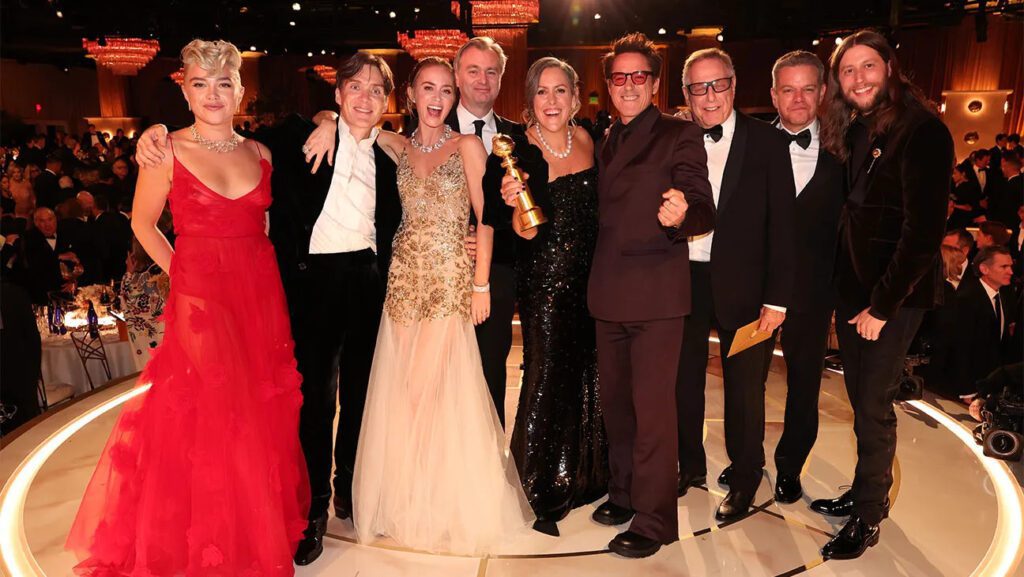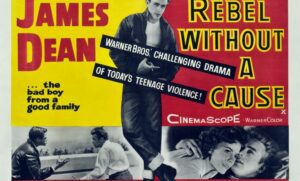THR’s executive editor of awards’ coverage on the impact of the overhaul of the Globes’ voting rolls, the winners who helped themselves most and the significance of the dominant showing by ‘Oppenheimer.’

What are my biggest takeaways from Sunday evening’s 81st Golden Globe Awards ceremony? Here are three.
1. This is not your old HFPA
Though some winners thanked the Hollywood Foreign Press Association, the HFPA is actually no more. The controversial group was dissolved after selling itself and its assets to Penske Media Eldridge (a joint venture between Penske Media Corporation and Eldridge that also owns The Hollywood Reporter). A few dozen former HFPA members were not invited to be part of the new organization, and a few dozen were, but they are now far outnumbered by the hundreds of journalists and critics who have been added to the voting rolls since the acquisition.
Whereas one used to have to be based in the L.A. area to be a member of the HFPA, Globes voters are now based all around the world. And whereas many HFPA members were not film critics, many of the new Globes voters are, having been recruited from FIPRESCI, the International Federation of Film Critics. I think that both of these factors were reflected in Sunday night’s results.
The French film Anatomy of a Fall won not only the award for best foreign-language film, but also for best screenplay, an award that had never gone to a principally non-English-language film. The challenging critics’ darling Poor Things beat fan favorite Barbie to win best musical/comedy picture. And The Boy and the Heron, an anime film from Japanese master Hayao Miyazaki, topped the Sony sequel Spider-Man: Across the Spider-Verse to win best animated feature.
The old HFPA was also famous for being — forgive the expression, but it was almost synonymous with them — star-fuckers, but the new Globes voters seem less concerned with the wattage of their winners. For instance, The Holdovers’ Paul Giamatti and Da’Vine Joy Randolph are not household names, but they were worthy winners. Indeed, the only two A-listers who won acting awards were Poor Things’ Emma Stone (best musical/comedy actress) and Oppenheimer’s Robert Downey Jr. (best supporting actor), and those wins stand on their own merits.
Also, the old HFPA often used to go out of its way to honor talent on the brink of stardom, ostensibly with the hope that those people would remember and return to them as they got bigger — something that often proved to be the case. But if those sorts of considerations were still widespread, May December’s Charles Melton and/or Priscilla’s Cailee Spaeny would have walked away with Globes. They did not.
2. Nobody was hurt, but some people were helped
There is zero overlap between the memberships of the Golden Globes and the Academy of Motion Picture Arts and Sciences, which is important to remember when speculating about the degree to which the Globes will presage the Oscars. In other words, not winning a Globe isn’t really cause for Oscar hopefuls to panic. Indeed, Past Lives, Maestro, The Zone of Interest, Spider-Man: Across the Spider-Verse, The Color Purple and May December all went home emptyhanded Sunday night, but I think it’s very possible that each of them will take home at least one award just a week from tonight at the Critics Choice Awards.
But a Globes win is an opportunity. As the first televised awards show of this awards season, the Globes effectively serves as a winner’s audition for Oscar voters watching in the room or at home on TV, who then ask themselves, “How does seeing that person holding and accepting a statuette make me feel?” That’s why acceptance speeches matter — what the winner chooses to make people think about, how the winner makes people feel, etc., shapes a vibe about the winner.
Giamatti, accepting best musical/comedy actor, attached more gravitas to The Holdovers when he dedicated his win to teachers: “It’s a movie about a teacher. I play a teacher in it. My whole family, they’re teachers, all of them, going back generations. Teachers are good people. We’ve got to respect them. They do a good thing. It’s a tough job. So this is for teachers.”
Lily Gladstone made sure to note in her speech — twice — that her best drama actress win for Killers of the Flower Moon was historic (she became the first indigenous performer to win a Golden Globe). Beginning her remarks by speaking in Blackfeet, she underlined how personal this role was to her. And by referencing problematic portrayals of indigenous people in old Hollywood movies, she reminded people about how much progress Killers represents.
And the fact that Barbie’s Ryan Gosling didn’t win best supporting actor doesn’t mean he can’t win at the Critics Choice Awards. But Oppenheimer’s Downey winning the Globe and then giving a funny and gracious speech certainly made a favorable impression on Critics Choice voters (voting is ongoing) and Academy members, and may have even tipped the scales for those who were undecided. He passed the test.
3. Oppenheimer dominated
Speaking of Oppenheimer, the Universal blockbuster was far and away the biggest winner of the night.
Plenty of films have won best drama picture at the Globes and then gone on to lose best picture at the Oscars, including 15 in the 21st century alone: 2022’s The Fabelmans, 2021’s The Power of the Dog, 2019’s 1917, 2018’s Bohemian Rhapsody, 2017’s Three Billboards Outside Ebbing, Missouri, 2015’s The Revenant, 2014’s Boyhood, 2011’s The Descendants, 2010’s The Social Network, 2009’s Avatar, 2007’s Atonement, 2006’s Babel, 2005’s Brokeback Mountain, 2004’s The Aviator and 2002’s The Hours.
But none of those films cumulatively took home five Globes, as Oppenheimer did: best drama picture, best director (Christopher Nolan), best drama actor (Cillian Murphy), best supporting actor (Downey) and best original score (Ludwig Göransson). That haul was more than double the next best showing this year and suggests a tremendous degree of admiration.
Nolan, like a lot of geniuses, can seem a bit aloof, which may have hindered him during past award seasons, since many voters are reluctant to vote for someone who they don’t believe cares about winning. But this season, Nolan has done a much better job of displaying some personality and humor (his Peloton story is the gift that keeps on giving) and showing that acknowledgment does mean something to him. And the fact that so many of his teammates kept winning Sunday allowed them to talk him up more than he would ever talk up himself.
Downey, in his acceptance speech, stated that Nolan had made “a goddamn masterpiece.” Murphy, in his, declared, “I knew the first time that I walked on a Chris Nolan set that it was different. I could tell by the level of rigor, the level of focus, the level of dedication…that I was in the hands of a visionary director, a master.” And Nolan’s wife and producer Emma Thomas, in her best drama picture acceptance speech, said, “I’m so pleased that Chris has been acknowledged because I just think that what he does is unlike anything anyone else is doing.”




